
We create avenues for the industry to gain more insights into emerging trends, industry-specific problems of national importance, and global best practices in logistics & supply chain management. We enable the industry to cut down transaction costs, increase efficiency, and enhance profitability. We are committed to sensitizing the industry about macro-level issues and helping find solutions to them.
News highlights from the world of supply chain and logistics that appeared in media over the last two months
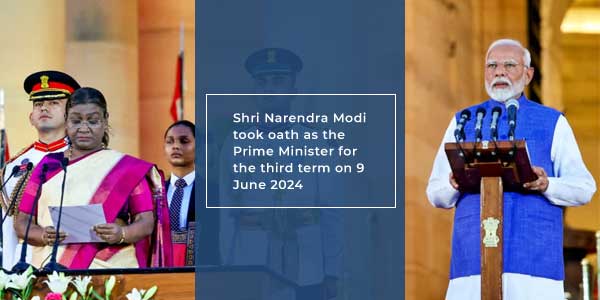
|
| Shri Narendra Modi took oath as the Prime Minister for the third term on 9 June 2024. The Prime Minister announced the key portfolios allotted to ministers a day after the swearing-in ceremony following which the ministers took charge of their departments. Smt. Nirmala Sitharaman took charge as the Finance Minister and the Minister of Corporate Affairs, Shri Amit Shah as Home Minister, Shri Rajnath Singh as Minister of Defence, Shri Nitin Gadkari as the Minister of Road Transport and Highways, and Shri Piyush Goyal as the Minister of Commerce and Industry. Please refer to this news report for the complete list. |
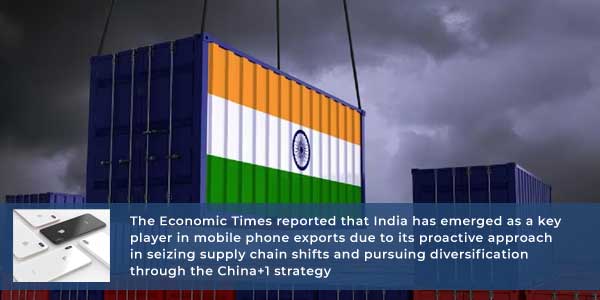
|
| The Economic Times reported that India has emerged as a key player in mobile phone exports due to its proactive approach in seizing supply chain shifts and pursuing diversification through the China+1 strategy. The impressive surge in exports, especially in the iPhone segment, represents a major achievement for India in the international market, stated the paper. The ET report cited officials who, referring to global trade data told the paper that while mobile exports from China and Vietnam fell by 2.78 percent and 17.6 percent respectively in FY24, exports from India surged by 40.5 percent. |
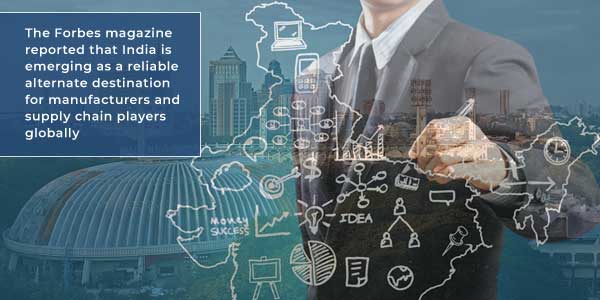
|
| The Forbes magazine reported that India is emerging as a reliable alternate destination for manufacturers and supply chain players globally. India's growing influence in the global supply chain is driven by its large labour force, expanding consumer base, and strategic location, the magazine noted. With projections placing it as the world's third-largest economy by 2027, India's appeal stems from its well-educated workforce, favorable business environment, and increasing openness to foreign investment. As supply chain leaders face geopolitical tensions and escalating costs, India is poised to play a significant role in shaping the future of global commerce, it said. |

|
| A June 27 ET article cited a recent Morgan Stanley report which has noted that the PM Gati Shakti scheme is transforming India's infrastructure. The Morgan Stanley report praised India's PM Gati Shakti scheme, highlighting its significant impact on infrastructure development. The report emphasized India's substantial increase in infrastructure investment, projected to rise from 5.3 percent to 6.5 percent of GDP by 2029, driven by a strong 15.3% compound annual growth rate (CAGR). |
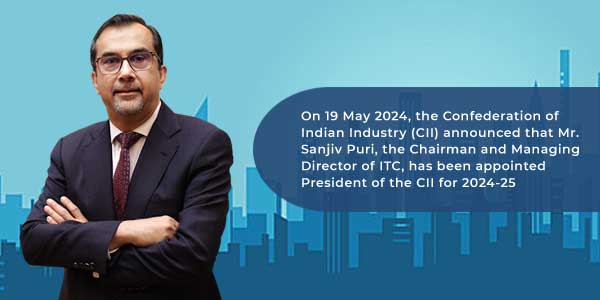
|
| On 19 May 2024, the Confederation of Indian Industry (CII) announced that Mr. Sanjiv Puri, the Chairman and Managing Director of ITC, has been appointed President of the CII for 2024-25. Mr. Puri succeeds Mr. R Dinesh, the Chairman of TVS Supply Chain Solutions, in this prestigious role.Mr. Puri, known for his leadership at ITC Ltd, brings extensive industry experience to his new position. He also serves as the Chairman of ITC Infotech India Ltd, overseeing its subsidiaries in the UK and US, and Surya Nepal Private Ltd.Mr. Rajiv Memani has been appointed as the President-Designate for the 2024-25 term. He serves as the Chairman for EY (Ernst & Young) in the India region and is a prominent figure in the global professional services sector. This appointment highlights CII's dedication to leveraging expertise from diverse sectors, considering Mr. Memani's pivotal role as the Chair of EY's Global Emerging Markets Committee. Mr. R Mukundan, the Managing Director and CEO of Tata Chemicals Limited, has taken on the role of Vice President for 2024-25. |
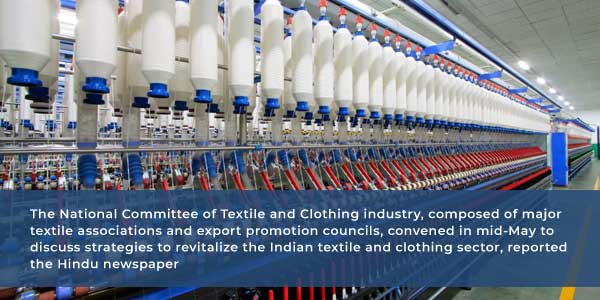
|
| The National Committee of Textile and Clothing industry, composed of major textile associations and export promotion councils, convened in mid-May to discuss strategies to revitalize the Indian textile and clothing sector, reported the Hindu newspaper. Rakesh Mehra, chairman of the Confederation of Indian Textile Industry (CITI), highlighted that the average capacity utilization in textile units throughout the value chain stands at 65 percent. Both global demand and domestic consumption have been low, leading to stagnation in export and domestic demand for the past two to three years, resulting in minimal growth rates. Concerns have been raised by both the industry and the government regarding the underutilization of production capacities due to limited economies of scale, deterring major brands from increasing their purchases from India. Additionally, investments in the supply chain have been hindered by the less-than-expected growth. |
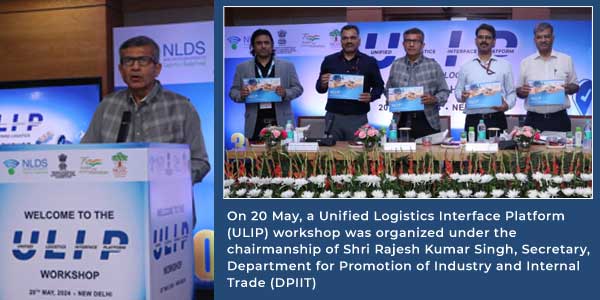
|
| On 20 May, a Unified Logistics Interface Platform (ULIP) workshop was organized under the chairmanship of Shri Rajesh Kumar Singh, Secretary, Department for Promotion of Industry and Internal Trade (DPIIT). The event, hosted at Vanijya Bhavan, saw enthusiastic participation from representatives of various states, including Telangana, Kerala, Haryana, Punjab, Maharashtra, Tamil Nadu, Chhattisgarh, Andhra Pradesh, Madhya Pradesh, Nagaland, and Rajasthan. Additionally, many industry associations, enterprises, and start-ups joined the workshop. Speaking on the occasion, Shri Rajesh Kumar Singh emphasized the critical role of ULIP in fostering collaboration and integration among states to create a unified logistics ecosystem. "ULIP offers an unprecedented opportunity for states to enhance their logistics frameworks. I encourage all states to actively leverage ULIP and drive forward a seamless, efficient, and inclusive logistics sector across India," he stated. |
INTERNATIONAL

|
| National Logistics Day was celebrated on June 28, 2024 in the U.S.. The idea is gaining popularity outside the U.S. too. This year, several Indian media outlets and industry organizations issued statements and articles on the occasion. The first National Logistics Day was established on June 28, 2019, by the American logistics and supply chain company Logistics Plus. It was registered with the National Day Calendar. A year later, the Transportation Intermediaries Association (TIA), one of the country's prominent logistics associations, embraced the cause. In 2021, National Logistics Day was officially endorsed by the state, with the U.S. House of Representatives issuing a formal Congressional Record honouring June 28 as National Logistics Day. This June 28, U.S. Senator Patrick Toomey and Pennsylvania Governor Tom Wolf both supported the day, and Pennsylvania approved a resolution within the House of Representatives to officially honour National Logistics Day. In India, media houses also spoke to logistics sector stakeholders to gather their perspectives on the occasion. In India, the Times of India newspaper featured opinions on the significance of the day from several industry leaders including Vineet Agarwal, MD of Transport Corporation of India (TCIL), Raaja Kanwar, Chairman and Managing Director of Apollo International, and Nishith Rastogi, Founder and CEO of Locus. The Indian edition of Entrepreneur magazine also published a sector-focused article noting that India's logistics sector is at a transformative stage, supported by advanced technologies and strong infrastructure development. |
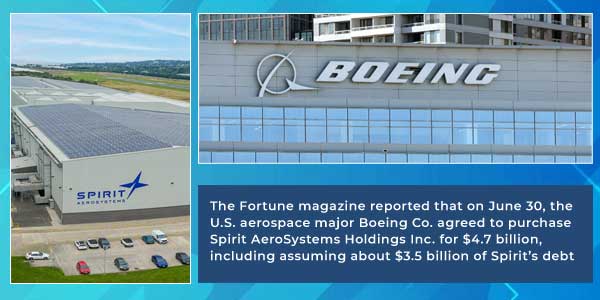
|
| The Fortune magazine reported that on June 30, the U.S. aerospace major Boeing Co. agreed to purchase Spirit AeroSystems Holdings Inc. for $4.7 billion, including assuming about $3.5 billion of Spirit’s debt. This deal includes acquiring Spirit’s manufacturing operations supporting its commercial jet lineup and gaining control over a portion of Spirit’s defence contract work. Additionally, Airbus SE is expected to announce its acquisition of some of Spirit's factories that manufacture structures and components for its commercial aircraft. "Reintegrating Spirit aims to help Boeing stabilize its supply chain and gain greater control of its aircraft production," stated the report. On its part, the European aerospace giant Airbus announced that, owing to some supply chain issues, it will not be able to meet the target of delivering commercial 800 aircraft, that it had announced earlier, reported MSN. Instead, the company aims to deliver around 770 commercial aircraft in 2024. "In commercial aircraft, Airbus is facing persistent specific supply chain issues mainly in engines, aerostructures and cabin equipment" the European aircraft maker said in a company statement. |
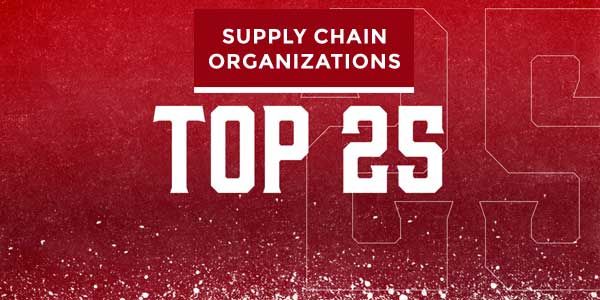
|
| In May, Gartner announced results from its 20th annual Global Supply Chain Top 25. The ranking recognizes leading supply chain organizations from across the world. "The supply chain organizations in this year’s Top 25 were notable for better protecting growth rates in a challenging operating environment, while at the same time delivering more sustainable operations," said Simon Bailey, VP Analyst, Gartner Supply Chain practice. “The best supply chains now have ESG criteria firmly embedded in their operations, while delivering higher than average growth rates, better returns on physical assets (ROPA), and stronger margins.” Schneider Electric retained the top position for the second year in a row, followed in second place by Cisco Systems. Colgate-Palmolive, Microsoft, and Johnson & Johnson made the top five positions. NVIDIA was this year's big entry, which surged into the Top 25 on the back of strong financial performance at the seventh position. The Supply Chain Top 25 ranking comprises two main components: business performance and community opinion. Business performance in the form of public financial and ESG (environmental, social, governance) data provides a view into how companies have performed in the past three years, while the community opinion component gives a peer and Gartner expert view of companies’ future potential and reflects leadership in the supply chain community. These two components are combined into a total composite score (see figure). |
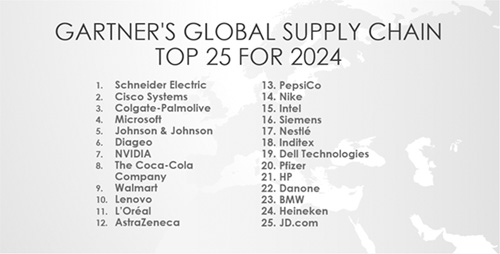
|

|
| Unilever CEO Hein Schumacher, in his blog on the company website, set out a roadmap to a Global Plastics Treaty with a heads-up that there is “no time to waste”. Mr Schumacher represented the Business Coalition for a Global Plastics Treaty at the fourth round of negotiations towards a UN treaty to end plastic pollution in Ottawa. Stating that the negotiations are at a critical juncture, Mr Schumacher emphasized that “Unilever and the Business Coalition are calling for global rules because voluntary initiatives alone will not solve the crisis. Furthermore, at Unilever, we know that for us to deliver on our plastic packaging commitments, we need all actors to pull in the same direction.” He stressed the importance of global organizations and governments prioritizing discussions on upstream measures such as phasing out problematic, avoidable plastic products in a coordinated way, and harmonizing design criteria for plastic packaging. He added, “Business responds to regulatory certainty, but the reality is we are facing a hugely fragmented policy environment for packaging from country to country." |

|
| The Automotive Logistics magazine interviewed BMW Group's heads of global vehicle distribution for a view into the company's logistics involved in moving 2.6million vehicles to customers globally on an annual basis. The talk provided insights into how the company works to ensure quality and punctuality in delivery with a clearer view of outbound distribution from the plants to the dealer network. To do this, the carmaker is utilizing the latest digital technology to achieve transparency and optimize routes and schedules, as well as adjust to disruptions and maintain a flexible outbound supply chain. It is also fostering long-term partnerships and improving communication with its transport partners. “It is like a crystal ball in that respect, looking at what could happen in the future and planning for incidents that might come up,” Mr Eugen Schantini, the head of BMW Group's global vehicle distribution shared with the magazine. “We’ve got a sophisticated forecast tool for all transport that looks for tomorrow, next week, next month, or for the next several years, and that is something we like to share with our logistics partners,” he added. |

|
| Consultancy firm KPMG. in a recently released report titled "Supply Chain Trends 2024 – The digital shake-up" provided insights into the use of AI in managing supply chains. This report discussed how businesses leverage purpose-built AI applications to process and analyze data. The report emphasized that supply chains are complex, involving various components such as product descriptions, quantities, and warehouse details. It highlighted how AI applications can streamline data processing to generate valuable insights and recommendations, including inventory management, identification of duplicate products, optimal storage strategies, assessment of efficient and inefficient policies, as well as analysis of order patterns and optimizations. Additionally, the report covered the ability of AI to efficiently identify and address environmental inefficiencies, such as pinpointing the sources of significant emissions. |

|
| The German business insurance multinational, Allianz Commercial, stated in its annual review that despite ongoing geopolitical tension, economic strife, and extreme weather events, global shipping losses have reached an all-time low, reported Supply Chain Digital. Only 26 large vessels were lost last year, compared to around 200 vessels 30 years ago. This represented a decline of more than a third year-on-year and a 70% drop over the past decade. However, the aforementioned risks persist, meaning that the industry has its work cut out to maintain this impressive feat. “The speed and extent of the way the industry’s risk profile is changing is unprecedented in modern times," said Captain Rahul Khanna, Global Head of Marine Risk Consulting, Allianz Commercial. “Conflicts, such as in Gaza and Ukraine, are reshaping global shipping, impacting crew and vessel safety, supply chains and infrastructure, and even the environment. Piracy is on the rise, with a worrying re-emergence off the Horn of Africa. The ongoing disruption caused by drought in the Panama Canal shows how the changing climate is affecting shipping, all at a time when it is having to undertake its most significant challenge: decarbonization,” he added. |

|
| The US FDA is closely monitoring the plastic syringe supply chain, particularly focusing on Chinese-made syringes, reported Politico. Several firms marketing Chinese-made plastic syringes in the U.S. are initiating voluntary recalls. The recalls came after an increase in product import alerts from the FDA. The agency has also issued a warning to consumers and healthcare providers not to use foreign-made syringes. In May, the FDA announced the names of Chinese manufacturers of medical devices that have been subject to import alerts, with the possibility of the number growing. According to Suzanne Schwartz, director of the FDA’s Office of Strategic Partnerships and Technology Innovation, the agency began investigating reports last summer of plastic syringes made in China that were breaking or leaking. |

|
| The European Business Review covered the complexities of the EU Supply Chain Law and listed ways in which global companies can understand them and integrate with them better. The article stated that the EU's new Supply Chain Law requires companies to ensure responsible sourcing throughout their global operations. This involves mapping entire supply chains, conducting risk assessments, and collaborating with logistics partners. While compliance involves costs and complexity, it offers benefits such as improved brand reputation, stronger supplier relationships, and a more resilient supply chain. This groundbreaking legislation sets a global precedent for ethical sourcing practices. In April of this year, the European Parliament had voted to adopt the European Union's Supply Chain Due Diligence Directive (CSDDD), also known as the "EU Supply Chain Law," taking a bold step towards corporate accountability. This groundbreaking legislation, a first from a global perspective, is set to be finalized in 2024. It will require companies operating in the EU to take full responsibility for human rights and environmental abuses throughout their global supply chains. |
| EVENT OF THE MONTH: CII IL'S BUILDING WAREHOUSING COMPETITIVENESS - EDITION 18 |
| CII Institute of Logistics organized the 18th edition of "Building Warehousing Competitiveness" on June 21, 2024, at The Taj Mahal Palace, Mumbai. Thought leaders from the industry and the government attended and shared insights on topics of significance pertaining to India's warehousing sector. Key areas explored during the conference included the different approaches to enhancing customer experience through modern warehousing, transforming operations through smart warehousing, and building a robust warehousing ecosystem for growth. Speakers highlighted the benefits of cost-and-quality leadership gained through value-added services, intelligent systems, improved infrastructure, and ESG-compliant warehouses. Mr Shyam Jagannathan, IAS, Director General of Shipping, Ministry of Ports, Shipping and Waterways, delivered the inaugural address, emphasizing the pivotal role of ports as global trade nodes. Mr Jagannathan highlighted how integrating intelligent systems across sea, rail, road, and air can revolutionize logistics by reducing transit times, improving coordination, and enabling real-time shipment tracking. He also underscored the benefits of automation and digital technologies like AI and IoT in enhancing efficiency and visibility in Free Trade Zones (FTZs) and warehouses. In a special address, Mr Pramod Kumar Agrawal, Principal Chief Commissioner of Customs, Mumbai Customs Zone-I, said, "Warehousing in India is currently undergoing a transformative phase, driven by technological advancements, policy reforms, and evolving trade dynamics. While we face several challenges, the opportunities for growth and development are immense. By embracing innovation, investing in infrastructure, and fostering collaboration, we can build an efficient warehousing network that supports India's economic growth, bringing us closer to the vision of a 'Viksit Bharat.'" A knowledge report on “Unlocking growth through intelligent warehousing” was released during the inaugural session. Click here for a copy of the report. The inaugural session was followed by three panel discussions that had sector experts deliberate on the various modern warehousing strategies and processes for enhancing customer experience. Some of the approaches included following an effective go-to-market strategy that encompasses innovation and providing ESG-compliant warehouses and cost leadership through economies of scale and value-added services. |
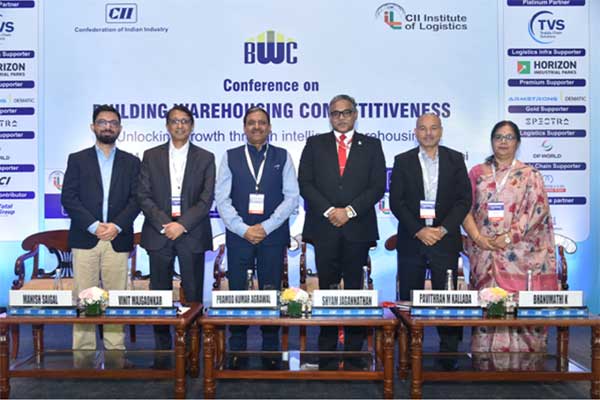 The inaugural session.
[L-R] Mr Manish Saigal, Managing Director, Alvarez and Marsal; Mr Vinit Majgaonkar, Chairman – STAR Committee, Chairman, Armstrong Dematic; Mr Pramod Kumar Agrawal, Principal Chief Commissioner Of Customs Mumbai Zone-I, Government of India; Mr Shyam Jagannathan, Director General of Shipping, Directorate General of Shipping, Ministry of Ports, Shipping and Waterways, Government of India; Mr Pavithran M Kallada, Managing Director Indian, Subcontinent, BDP UGL Global Logistics India Pvt. Ltd; Dr. K. Bhanumathi, Chief Operating Officer, CII Institute of Logistics.
The inaugural session.
[L-R] Mr Manish Saigal, Managing Director, Alvarez and Marsal; Mr Vinit Majgaonkar, Chairman – STAR Committee, Chairman, Armstrong Dematic; Mr Pramod Kumar Agrawal, Principal Chief Commissioner Of Customs Mumbai Zone-I, Government of India; Mr Shyam Jagannathan, Director General of Shipping, Directorate General of Shipping, Ministry of Ports, Shipping and Waterways, Government of India; Mr Pavithran M Kallada, Managing Director Indian, Subcontinent, BDP UGL Global Logistics India Pvt. Ltd; Dr. K. Bhanumathi, Chief Operating Officer, CII Institute of Logistics.
|
| Session one titled "Enhancing Customer Experience Through Modern Warehousing" focused on the evolution of warehousing in India from traditional 'godowns' to organized, technologically advanced logistics parks with multiple warehouses and value-added services. Panellists emphasized that modern facilities ensure efficient space utilization, smooth vehicular movement, and ESG compliance. The session highlighted how increased capital investment and government schemes and initiatives like the Production Linked Incentive (PLI), the National Logistics Policy, PM Gati Shakti, Sagarmala, Bharatmala, and Multi-Modal Logistics Parks (MMLPs) are contributing to an efficient logistics infrastructure. In relation to the customer experience, Jivraj Papdiwal, Head of Customer service, Logistics & Warehousing, Marico Limited said that there has been a dramatic shift in how FMCG customers have evolved over the past few decades. Earlier, the majority of business occurred through distributors, who would distribute products to Kirana shops and similar outlets. "Today, customer segments like e-commerce, modern trade, and the B2B channel have grown in proportion to the distributive segment," he added. |
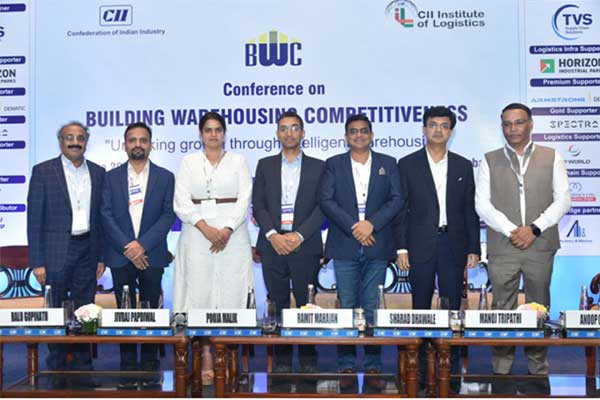 Session 1.
[L-R] Mr Balu Gopinath, General Manager, HOD Domestic logistics and Corporate Strategy, Dr. Reddy's Laboratories; Mr Jivraj Papdiwal, Head of Customer Service, Logistics & Warehousing, Marico Limited; Ms Pooja Malik, National Head Leasing, Horizon Industrial Parks; Mr Ramit Mahajan, Head Customer Experience IMEA, Henkel; Mr Sharad Dhawale, Chief Supply Chain Officer, Raychem RPG (P) Ltd; Mr Manoj Tripathi, Chief Executive Officer, TCI Supply Chain Solutions; Session Chairman: Mr Anoop Chauhan, Chief Executive Officer – Contract Logistics Subcontinent, DP World.
Session 1.
[L-R] Mr Balu Gopinath, General Manager, HOD Domestic logistics and Corporate Strategy, Dr. Reddy's Laboratories; Mr Jivraj Papdiwal, Head of Customer Service, Logistics & Warehousing, Marico Limited; Ms Pooja Malik, National Head Leasing, Horizon Industrial Parks; Mr Ramit Mahajan, Head Customer Experience IMEA, Henkel; Mr Sharad Dhawale, Chief Supply Chain Officer, Raychem RPG (P) Ltd; Mr Manoj Tripathi, Chief Executive Officer, TCI Supply Chain Solutions; Session Chairman: Mr Anoop Chauhan, Chief Executive Officer – Contract Logistics Subcontinent, DP World.
|
| Session two titled "Transforming operations through smart warehousing" has speakers discuss the transformation of warehouse operations through smart practices, and the trend towards larger and more complex facilities. Panellists highlighted the crucial role of planning and in boosting productivity through strategic planning and ERP system integration. Ajit Jangle, Managing Director, FM Logistic India said that, with consumers demanding faster delivery and increasing competition among organizations, supply chain providers must offer improved solutions to meet customer expectations. |
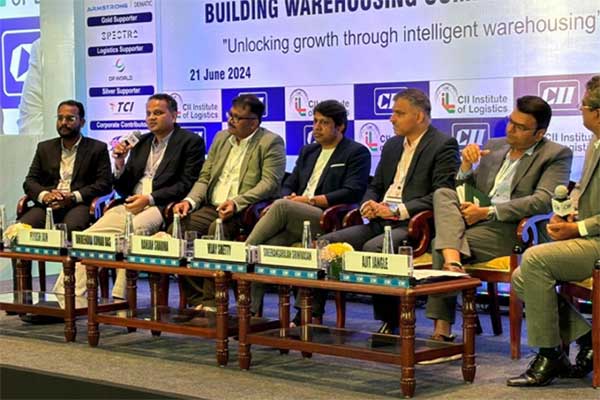 Session 2.
[L-R] Mr Sagar Raghorte, Deputy General Manager Strategy & Supply Chain Management, The Belgian Waffle Co; Mr Piyush Jain, Vice President – Solutions, Addverb Technologies; Mr Dhirendra Das, Head of Supply Chain, UltraTech Cement; Mr Ranjan Sharma, Chief Information Officer and Head of Supply Chain, Bestseller India; Mr Vijay Shetty, Senior Vice President - Global Distribution and Supply Chain, Alkem Laboratories Ltd.; Mr Sreerangarajan Srinivasan, Head of Logistics and Customer Service, NIVEA India; Session Chairman: Mr Ajit Jangle, Managing Director, FM Logistics India.
Session 2.
[L-R] Mr Sagar Raghorte, Deputy General Manager Strategy & Supply Chain Management, The Belgian Waffle Co; Mr Piyush Jain, Vice President – Solutions, Addverb Technologies; Mr Dhirendra Das, Head of Supply Chain, UltraTech Cement; Mr Ranjan Sharma, Chief Information Officer and Head of Supply Chain, Bestseller India; Mr Vijay Shetty, Senior Vice President - Global Distribution and Supply Chain, Alkem Laboratories Ltd.; Mr Sreerangarajan Srinivasan, Head of Logistics and Customer Service, NIVEA India; Session Chairman: Mr Ajit Jangle, Managing Director, FM Logistics India.
|
| The third and the concluding session titled “Building a robust warehousing ecosystem to drive growth” focused on the changing landscape of warehousing in India amid economic growth. The discussions highlighted a shift towards decentralized warehousing, emphasizing the growing importance of regional centers in distribution logistics. The emergence of large-scale, multimodal logistics parks with advanced warehouses was identified as crucial for India's future warehousing trends over the next 5-10 years. Key challenges addressed by the speakers included land acquisition, regulatory approvals, logistical connectivity, construction timelines, strategic location selection, supplier management, and workforce preparedness. The panel also explored how multimodal logistics parks streamline goods movement, impact regional warehousing and transportation sectors, and anticipated future developments in the warehousing industry. |
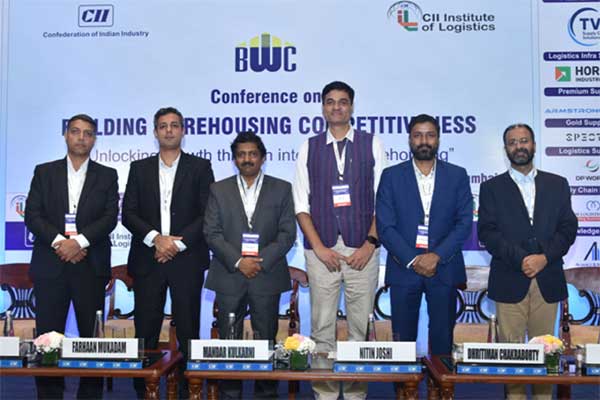 Session 3.
[L-R] Mr Sai Sridhar, Principal Counsellor, CII Institute of Logistics; Mr Farhaan Mukadam, Senior Director, Alvarez & Marsal; Mr Mandar Kulkarni, Head of Warehouse and Logistics, SUN PHARMA; Mr Nitin Joshi, Head Warehousing & Logistics, FABINDIA LIMITED; Mr Dhritiman Chakraborty, Director Operations, Ingram Micro; Session Chairman: Mr Girija Shanker, Chief Product Officer – Logistics and Service, India/South Asia A.P. Moller – Maersk.
Session 3.
[L-R] Mr Sai Sridhar, Principal Counsellor, CII Institute of Logistics; Mr Farhaan Mukadam, Senior Director, Alvarez & Marsal; Mr Mandar Kulkarni, Head of Warehouse and Logistics, SUN PHARMA; Mr Nitin Joshi, Head Warehousing & Logistics, FABINDIA LIMITED; Mr Dhritiman Chakraborty, Director Operations, Ingram Micro; Session Chairman: Mr Girija Shanker, Chief Product Officer – Logistics and Service, India/South Asia A.P. Moller – Maersk.
|
We will connect again next month, with a comprehensive dossier of news, trends and events from the industry.